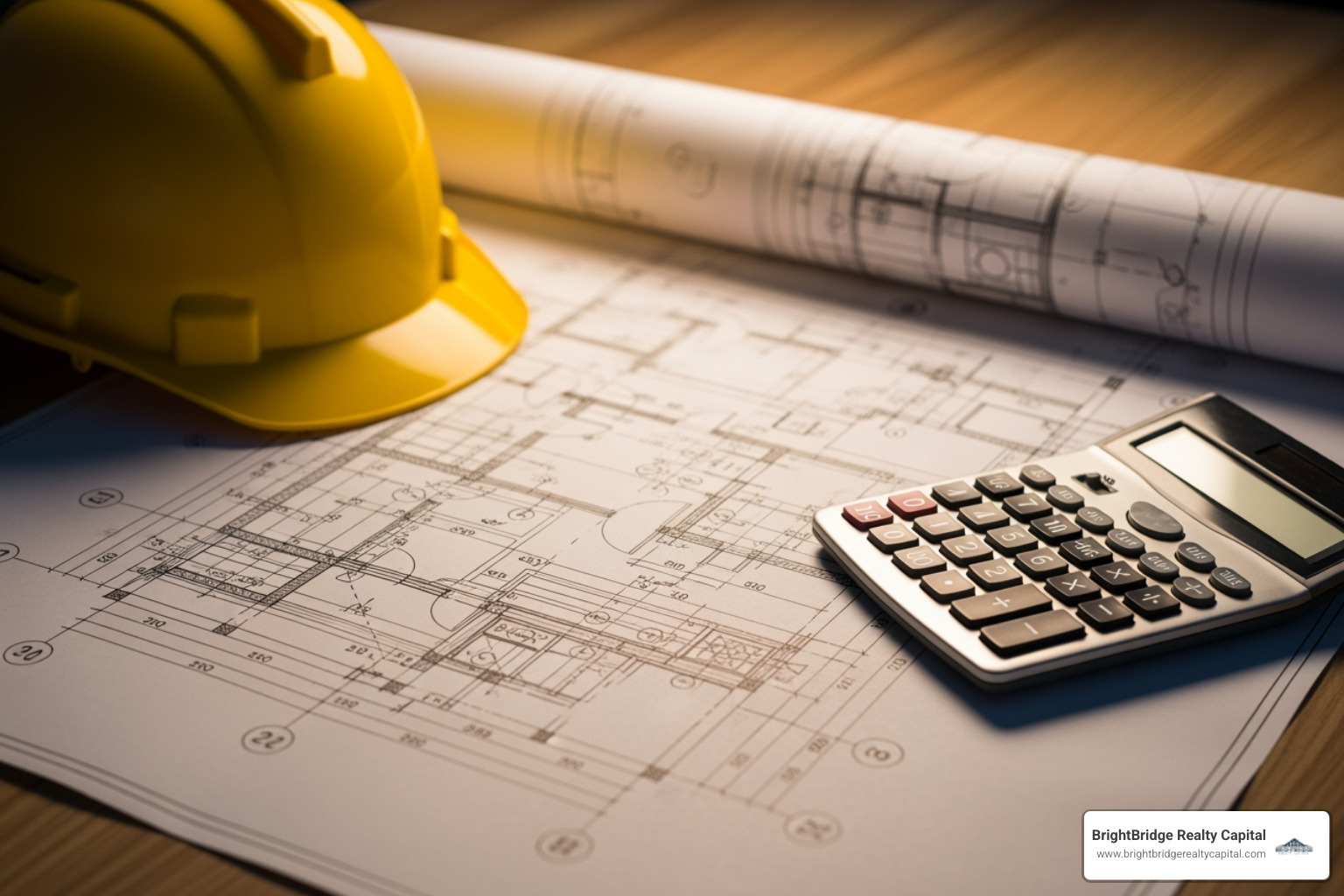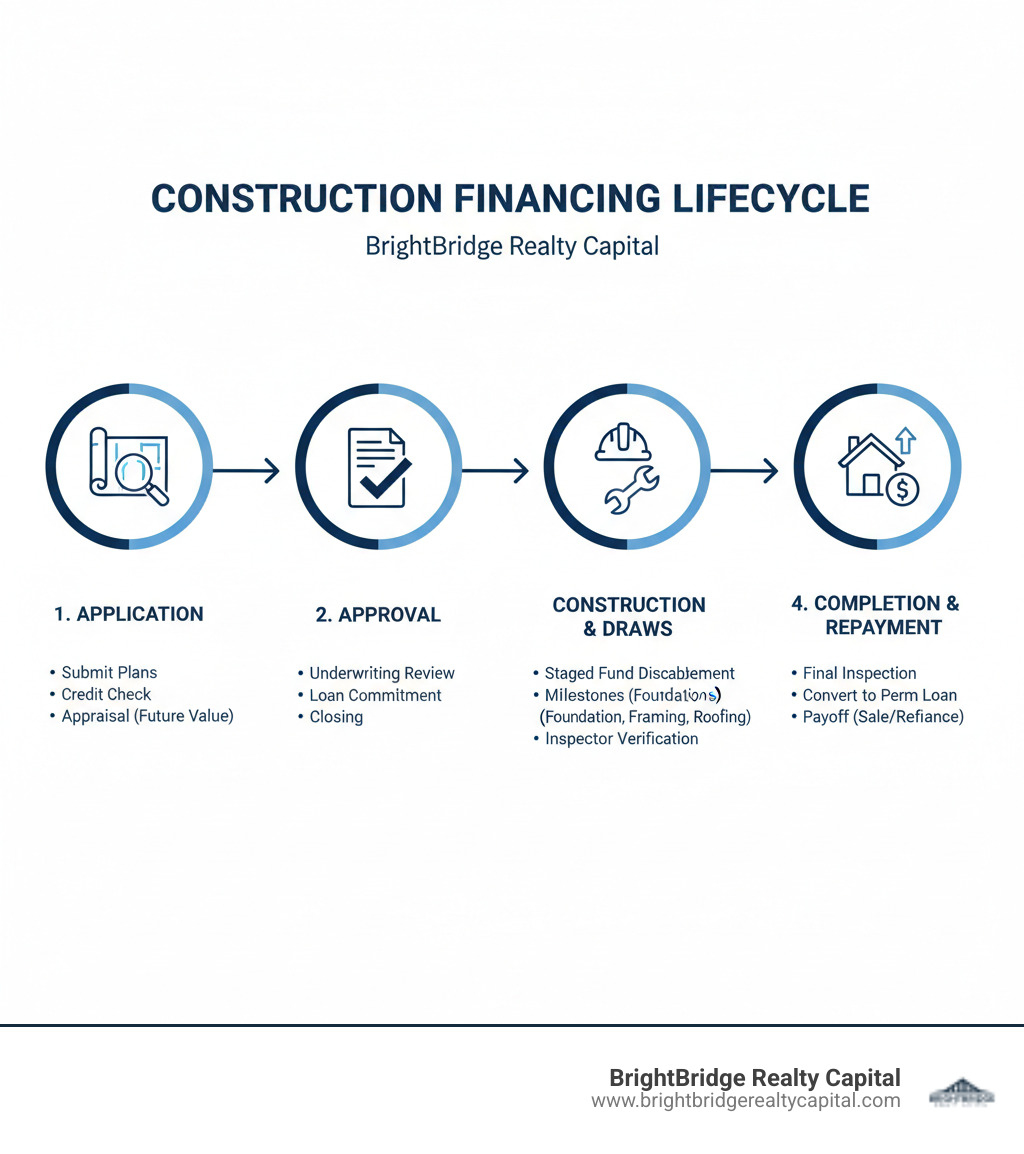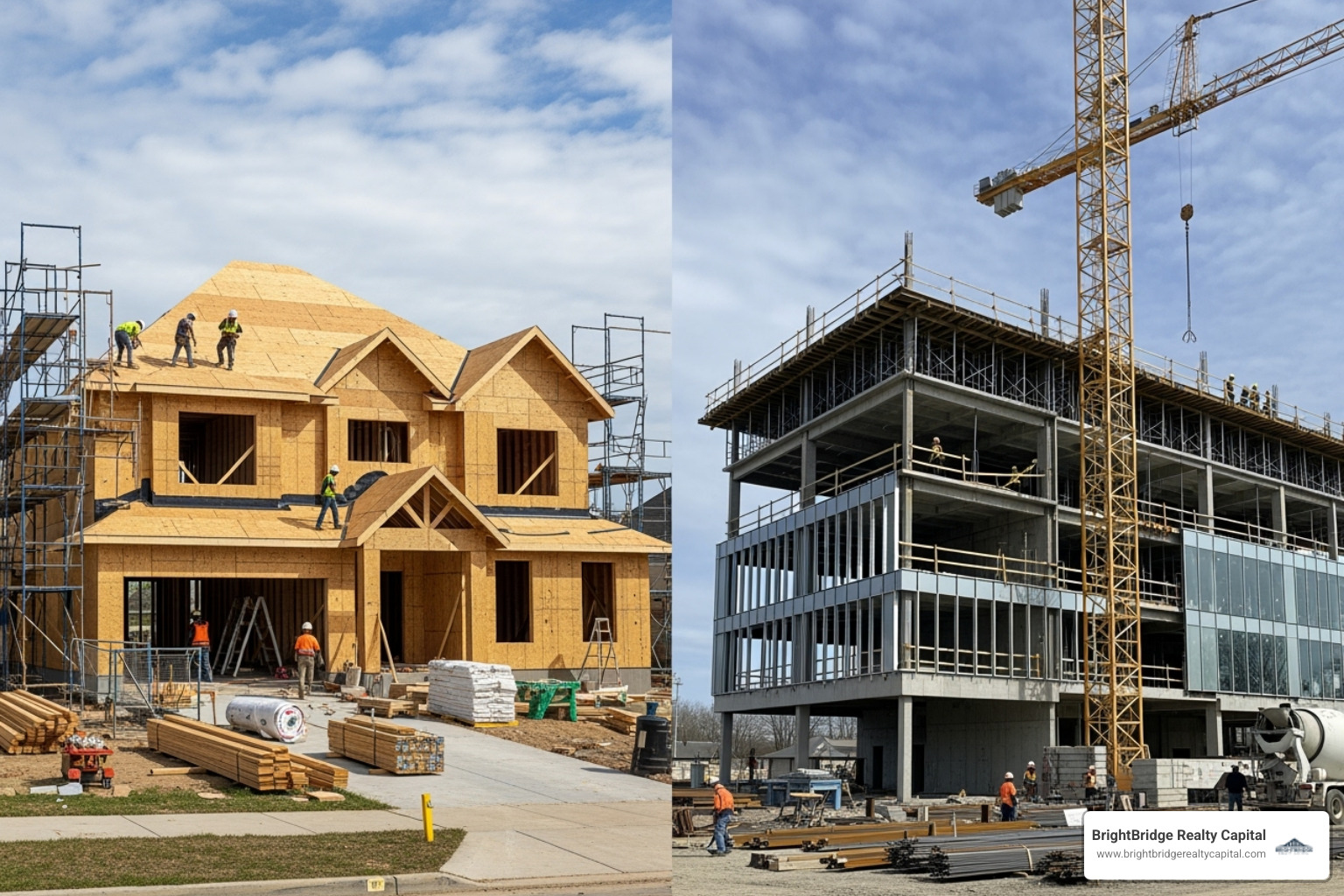Your Blueprint for Funding: Comprehensive Construction Financing Options

Why Construction Financing Solutions Are Essential for Your Building Project
Construction financing solutions are specialized loans that fund a building project from the ground up. Unlike traditional mortgages, funds are disbursed in stages to cover land, materials, labor, and other costs as the project progresses. Here are the main options available:
| Financing Type | Best For | Key Feature |
|---|---|---|
| Construction-Only Loan | Ground-up builds with separate permanent financing | Short-term (12-36 months), interest-only payments |
| Construction-to-Permanent Loan | Streamlined single-close process | Converts to mortgage after completion |
| Bridge Loan | Quick access to capital during construction | Temporary financing until permanent loan is secured |
| Hard Money Loan | Investors needing fast approval | Asset-based, higher rates, 6-12 month terms |
| HELOC | Using existing property equity | Draw only what you need, pay interest on used amount |
The construction industry is booming, and with rising project costs, securing the right funding is critical. For investors and developers, understanding financing options is key to managing cash flow and completing projects on time. For example, the current housing market in Georgia shows climbing home values, highlighting the opportunities available with proper funding. Whether you're building rental properties or tackling multi-family projects, the right financing can mean the difference between breaking ground and missing an opportunity.
These loans typically last 12-36 months with interest-only payments. Funds are released in stages (“draws”) tied to construction milestones. Lenders usually require a 680-700+ credit score, a 10-25% down payment, detailed plans, and a licensed contractor. After completion, you can refinance, sell, or secure rental financing.
I'm Daniel Lopez, a loan officer at BrightBridge Realty Capital. I specialize in helping investors and builders steer complex construction financing solutions. My goal is to clarify the loan process so you can proceed with confidence on your next project.

How Construction Loans Work: From Foundation to Finish

A construction loan is a financial tool that grows with your project. Unlike a traditional mortgage for an existing home, construction financing solutions are designed for the unique rhythm of a new build.
These are short-term loans, typically lasting 12 to 36 months, with interest-only payments during the build. This structure keeps your cash free for materials, labor, and permits. The loan covers all project costs, including land acquisition, materials, labor, permits, and a contingency for unexpected expenses.
The Draw Process: Funding as You Build
Instead of a lump sum, construction financing solutions release money in stages called "draws," which are tied to project milestones. For example, after the foundation is completed and inspected, the next draw is released. This process repeats for framing, roofing, and other key phases.
A third-party inspector verifies work completion before each draw, protecting all parties by ensuring the project stays on track and on budget. Crucially, you only pay interest on the funds disbursed, not the total loan amount. This saves you money, especially in the early stages.
Construction Loans vs. Traditional Mortgages: A Tale of Two Structures
Construction loans and traditional mortgages are designed for different situations. A traditional mortgage finances an existing property. You get a lump sum at closing and immediately start paying principal and interest. The bank's risk is lower because they're lending against a finished asset.
In contrast, construction loans finance potential—a set of blueprints. The collateral evolves as the project progresses. Because the property has no market value until it's finished, lenders see more risk, leading to stricter eligibility requirements.
Exit Strategies: Your Path After Completion
Every construction loan requires a clear exit strategy for repayment upon completion. Having your plan figured out before you break ground is essential, as it shapes the loan structure from the start.
Refinancing into a permanent mortgage is the most common path for those who plan to live in the home or hold it as a long-term investment. Many lenders offer construction-to-permanent loans that combine both phases into a single, streamlined closing.
For builders creating a property to sell, the exit strategy is to sell the property and use the proceeds to pay off the loan. This is standard for spec homes and new developments.
Investors building rental properties typically transition to long-term rental property financing after completion, often once tenants are in place.
A Guide to Construction Financing Solutions

This section is your roadmap to construction financing solutions, covering our core offerings at BrightBridge Realty Capital and other specialized options.
Core Construction Financing Solutions Offered by BrightBridge Realty Capital
At BrightBridge Realty Capital, our direct lending model allows us to close loans within a week. We provide fast, straightforward funding for investors and developers who need to move quickly.
Construction-only loans are short-term (12-24 months) loans with interest-only payments, ideal for ground-up builds. They offer maximum flexibility for your exit strategy, whether you plan to sell, refinance, or hold the property. This is a powerful tool for experienced builders who want to arrange permanent financing separately.
Construction-to-permanent loans offer a streamlined, single-close process. You apply and close once. The loan starts with interest-only payments during construction and automatically converts to a traditional mortgage upon completion. Your permanent rate is locked in upfront, protecting you from rate hikes. A credit score of 700+ is typically required.
Our rental property construction loans are designed for investors building income-generating assets like single-family rentals or multi-family complexes. We understand the goal is long-term cash flow, and our direct lending model provides competitive rates and fast funding to get your properties producing returns. Explore your options with our Rental Loans.
Bridge loans for construction provide short-term capital to cover funding gaps, such as securing a new site before a current property sells. They act as a temporary financial bridge to keep your project on track. Learn more on our stabilized bridge page.
Specialized Construction Financing Solutions
Beyond our core offerings, the financing landscape includes other specialized solutions.
Modular construction loans finance projects built with off-site manufactured components. They address the unique payment schedules required by manufacturers, providing capital to cover upfront costs and keep the project moving until you can secure traditional financing.
Commercial and multi-family construction loans fund large-scale projects like apartment buildings, Build-to-Rent communities, or industrial facilities. They involve larger loan amounts and complex, custom underwriting based on market factors and developer experience. Funding can range into the tens of millions.
Government programs and incentives can significantly reduce project costs. Federal, state, and local programs often support affordable housing or energy-efficient developments through low-interest loans, grants, or tax incentives. Researching these opportunities in your area is a worthwhile investment.
Qualifying and Preparing Your Application
Getting approved for construction financing solutions requires proving your project is a sound investment. Lenders need to see that you've done your homework and have the capacity to complete the build.
Key Eligibility Criteria for Construction Loans
Your credit score is a key factor. Most lenders look for a score of 680-700+. A higher score generally leads to better loan terms.
The down payment, typically 10% to 25% of the project cost, demonstrates your commitment and is required by most lenders. Having "skin in the game" reduces lender risk.
Detailed project plans are non-negotiable. This includes architectural drawings, permits, a line-item budget, and a realistic timeline. Thorough plans inspire lender confidence.
Your general contractor must be licensed, insured, and experienced. Lenders will verify their track record, as their expertise is crucial to keeping the project on time and on budget.
The appraisal for a construction loan is based on the project's projected future value after completion. This “as-completed” value helps determine the maximum loan amount.
Your 5-Step Checklist to Get Approved
With the right preparation, you can move through the approval process smoothly. Here's your roadmap:
Step one: Solidify your budget and plans. Create a detailed budget for all costs and include a contingency fund of 10-15%. This fund is your safety net for unexpected expenses and is something lenders look for.
Step two: Vet and hire your general contractor. Choose a licensed, insured builder with a strong portfolio and good references. A qualified contractor strengthens your loan application.
Step three: Gather all required documentation. Compile personal and business financials, project plans, cost schedules, timelines, and proof of down payment. A complete application package speeds up the underwriting process.
Step four: Compare lenders and loan products. Look for a lender with competitive rates, flexible terms, and expertise in your project type. At BrightBridge Realty Capital, our direct lending model allows for fast closings, often within a week.
Step five: Submit a complete application. Double-check that all documents are included and forms are filled out correctly. A professional, complete application shows you are organized and helps expedite approval.
The approval process is demanding for a reason: we're making sure you have the best possible chance of success with your build.
Navigating Risks and Managing Project Cash Flow

Construction projects come with predictable challenges. With proper planning and the right construction financing solutions, you can steer them successfully.
Common Challenges and How to Mitigate Them
Budget overruns are a common concern. You are typically responsible for covering any costs beyond the loan amount. The best defenses are a 10-15% contingency fund and negotiating fixed-price contracts with your builder to transfer risk.
Construction delays from weather, supply chain issues, or permit hold-ups can increase interest costs. Mitigate this by building realistic timelines with buffers, maintaining constant communication with your team, and exploring tools like interest rate caps or locking in your permanent rate early with a construction-to-permanent loan.
Interest rate risk with variable-rate loans can increase your carrying costs if rates rise. Fixed-rate options or rate caps can protect you from this market volatility while you focus on getting the project done.
Using Financing to Improve Cash Flow
Construction financing solutions are strategic tools for improving business cash flow.
A construction loan covers significant upfront costs like land, permits, and materials, preserving your working capital for other opportunities. This is how businesses scale—by using smart financing to multiply their capacity.
Financing also helps streamline construction payments. It can bridge the gap between paying your suppliers and getting paid by your client, helping you maintain good relationships with subcontractors and avoid project liens or delays.
At BrightBridge Realty Capital, we understand cash flow management. Our direct lending model and fast closings provide the right money at the right time, helping you build a sustainable, growing business.
Frequently Asked Questions about Construction Financing
Here are answers to the most common questions about construction financing solutions to help you move forward with confidence.
What happens if my construction project goes over budget?
If your project goes over budget, you are typically responsible for covering the extra costs out of pocket. This is why a 10-15% contingency fund in your initial budget is essential. It's your financial safety net for unexpected costs like material price spikes or required site work.
For substantial overruns, you can discuss options with your lender, but additional financing is not guaranteed and depends on your loan agreement and project progress. Proactive budget management and transparency with your contractor are the best ways to prevent major overruns.
How are construction loan funds disbursed?
Construction loan funds are disbursed on a "draw schedule." Instead of a lump sum, money is released in stages (“draws”) as you complete specific project milestones (e.g., foundation, framing, roofing). A third-party inspector, arranged by the lender, verifies the work before each draw is released.
This process protects all parties and ensures you only pay interest on the funds you've used, which saves you money during the early phases of construction.
Can I act as my own general contractor?
While tempting, acting as your own general contractor (an “owner-builder”) makes securing financing more difficult. Most lenders require a licensed, professional GC because they want assurance that an expert is managing the complex build process.
Some specialized lenders may consider an owner-builder loan if you can prove extensive construction experience and licensing, but expect stricter requirements and potentially higher rates due to the increased risk. If you plan to go this route, be upfront with your lender from day one and provide a detailed plan that demonstrates your capability.
At BrightBridge Realty Capital, we discuss your unique situation to help find the right financing path for your project.
Conclusion: Building Your Future with the Right Financial Partner
This guide has shown that construction financing solutions are strategic tools for turning your vision into reality while managing cash flow and risk. Even the most experienced builders need the right financing partner—one who understands construction, moves fast, and offers flexibility.
That's where we come in. At BrightBridge Realty Capital, we are direct lenders who understand real estate. We offer customized construction financing solutions and work directly with you to design a loan for your specific project, whether it's a single-family rental, a multi-family complex, or a commercial build.
Speed is critical in real estate. We know that when an opportunity arises, you can't afford to wait months for bank approval. We close deals fast—often within a week—thanks to our streamlined process, allowing you to seize opportunities without delay.
Building from the ground up requires a solid financial foundation. We provide the expertise and support to help you build with confidence. We're here to be the partner that extends support beyond the closing table.
Ready to turn your blueprints into reality? Let's talk about how we can support your next project. Explore your options for ground-up construction financing with BrightBridge Realty Capital today. Your future is waiting to be built—let's lay the financial groundwork together.


